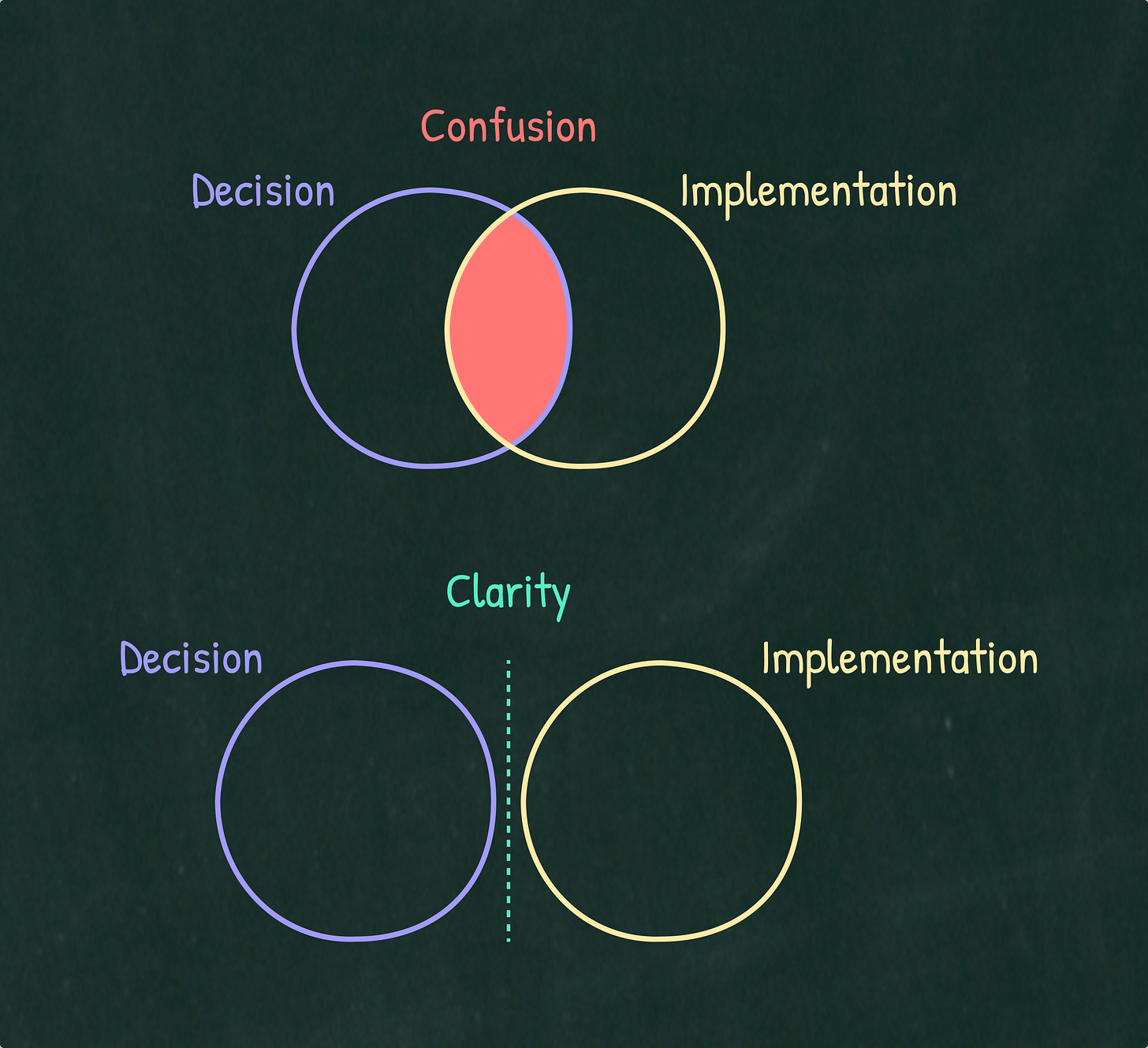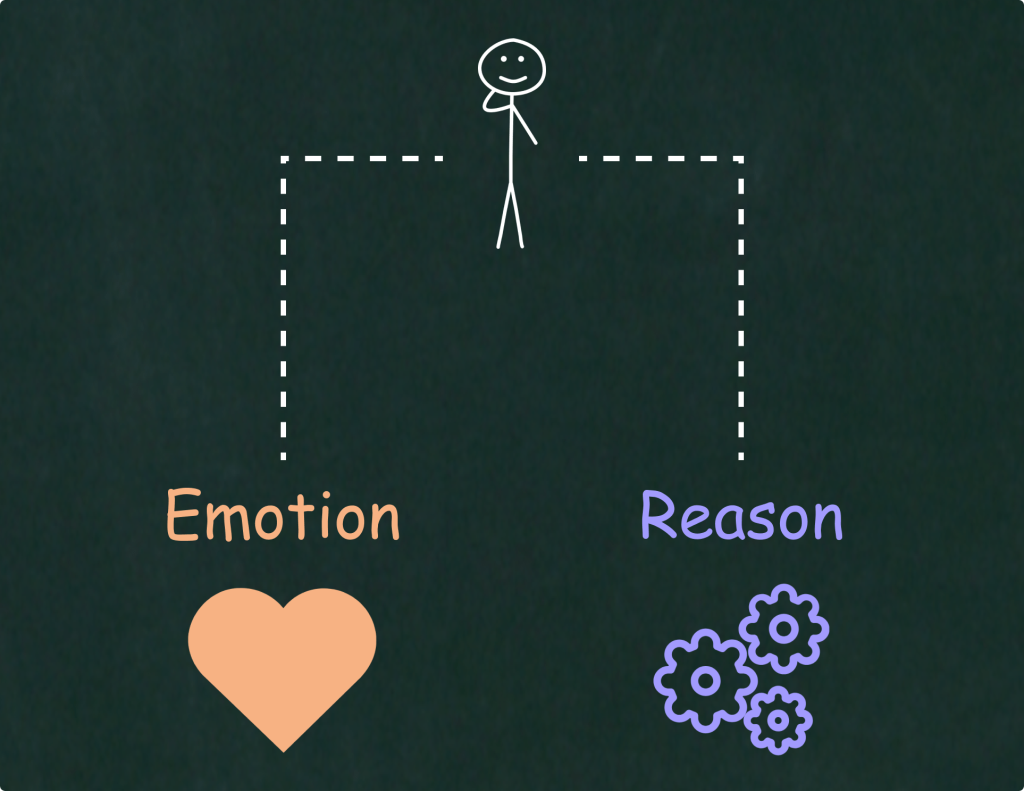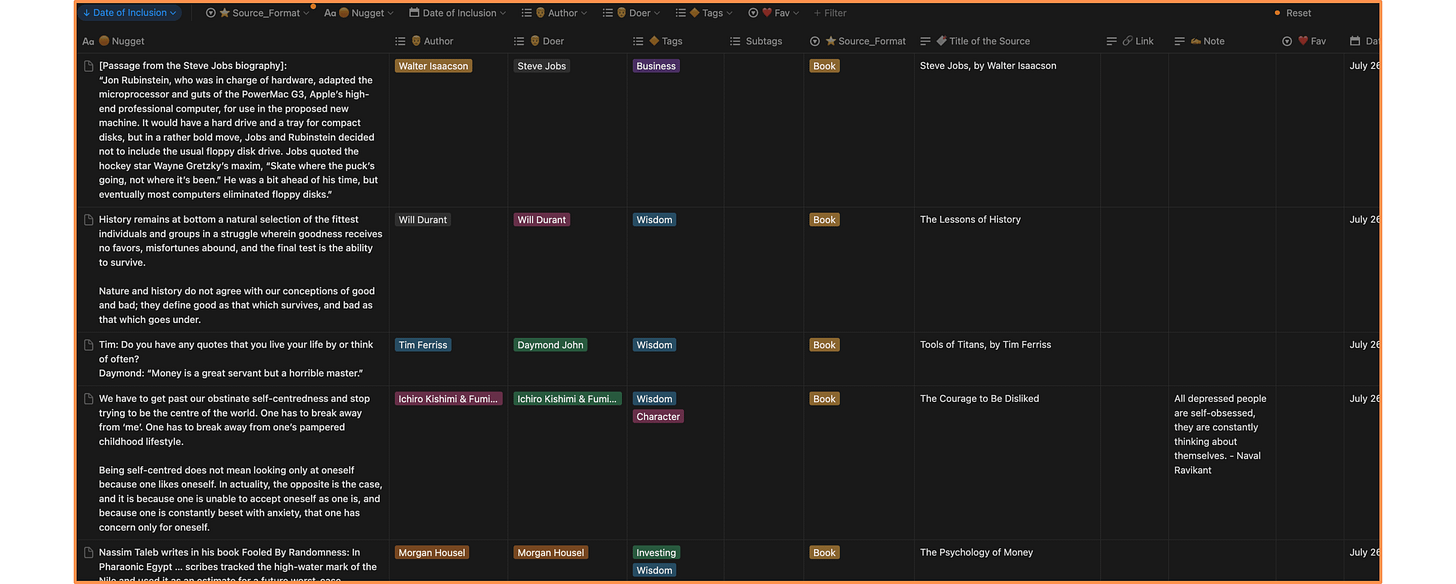How To Make Hard Decisions Easy
Nugget by Matt Mochary (Coach of Naval Ravikant)
👋 Hey friend,
Today’s insight comes from an episode of the Tim Ferriss Podcast, where Tim interviewed Matt Mochary—who is a former founder and coach of top founders in Silicon Valley such as Naval Ravikant (AngelList), Steve Huffman (Reddit), Sam Altman (OpenAI), Brian Armstrong (CoinBase), among many others.
I found the insight super helpful for making hard decisions much easier, and you can apply the lesson to any hard decision.
👤 Doers
💡Nugget
Tim Ferriss asked Matt Mochary to explain his advice separate decision from implementation.
Below you can read Matt's answer...🟠 Matt Mochary:
This was something I learned recently, and one of the beautiful things about my coaching is that I feel like I'm the student. I haven’t invented anything. Everything that I do, I learned from somebody else or read in a book—which is also learning from somebody else. And I'm just packaging it in a way that's easy to understand.
So this comes from Wei Deng, who is the CEO of Clipboard Health. She's mind-blowing. I've learned so much from her.
And we were sitting around at a Sequoia CEO retreat that brought like 10 CEOs to Kauai to see me, and the idea was I was going to sit and coach them for three days...
And Wei Deng ended up being the person that people wanted to hear from way more than from me, and me too. I mean, her answers were insanely good.
And she shared with us this rubric, which is really identifying fear. Often times when you're having a difficult time making a decision, it's because you're conflating the decision itself with the implementation of the decision.
So it's pretty damn clear what you need to do, what the right decision is, because there's a constituency here that you're trying to optimize for. So in any organization, there's a human that you are prioritizing.
So if it's a company, you're probably prioritizing the customer.
If it's an investment firm, you're probably prioritizing your LPs.
If it's your own personal life, you need to be prioritizing you.
And then there's implementation. There's someone who, when you know what's right for the customer and you implement it, someone's going to get hurt. Maybe it's that you have someone who's not performing well. If you're making a decision just for the customer, clearly you would let go of this person, but this person maybe is in the middle of getting a divorce, Christmas is coming, and how will the person pay for the private school tuition their kids are in? And you don't want to be the one to impose that pain and suffering on that person, so you have a really hard time making this decision.
But if you separate the two and think, “Okay, customer needs this person let go.” This person will be pained, and I will be pained too, so I'm going to get hurt by the implementation. Then think of, “Well, what does this person—who's going to get hurt by the implementation—what is it that they really want?" So the person who's going to be fired, what they really want is financial security. They want to find a place where they are valued, they are needed, and pays enough money to cover their life expenses. You, what do you really want? You don't want to be the bad guy. You want to not impose pain on someone. You actually want to help someone find their place where they can have what they want, which is financial security.
So what do you do? You then think about, “How can I achieve that in the implementation?” Well, you can achieve that by becoming the person's career agent. You say, “This is not working here, but I want to help you find the place that's going to work for you. So, I know that you're passionate about A, yet right now, we're having you do B, and you're not great at it. But A, you're great at. Let's find a place that needs A, and I will wholeheartedly recommend you for A. In fact, I'm not going to just recommend you. I'm going to go out and advocate for you. I'm going to send out tweets, I'm going to send out emails, I'm going to send out texts to people saying, 'This guy or woman is fantastic at this. Can you please consider them?'” Because as an agent, one hour of time spent will equal 100 hours of time spent by the candidate themselves.
And so that's when you can—once you’re able to separate the two, once you say, “What's best for the customer, clearly, that's what's best. How do I minimize the damage on the person that gets hurt.” Now you can actually go forward, and you can make a good decision that doesn't actually hurt people unnecessarily.
👉 Video Source: CEO Coach Matt Mochary — Coaching Tim, Why Fear and Anger Give Bad Advice, and More
✍️ New Essay
I recently co-authored (with my friend Brian David Crane) an essay in which we explored the differences between Emotion and Reason.
We concluded that both are critical because emotions guide us to what we want, and reason is necessary to execute and achieve what we want.
👉 If you are curious, click here to read the full piece (for free)
📙 Doers Notebook
All the nuggets I’ve picked for the past 5 years are saved and classified in a searchable Database, which (as of August 2025) contains 4,595 timeless ideas (sourced directly from the most influential doers and entrepreneurs — captured on books, interviews/podcasts, tweets, and articles).
I call this Database The Doers Notebook, and it’s open for anyone who wants it.
🤔 Why did I build this?
Well, as the Latin motto goes, “A chief part of learning is simply knowing where you can find a thing.” And since it’s all 🔎 searchable, we only need to type a keyword to immediately get a list of insights related to it!
For instance, if I’m unsure about how to get more sales in my business, I can simply type the word “sales” and immediately get 126 insights! (search results that contain the keyword “sales”). In this case from Jim Edwards, Peter Thiel, Naval Ravikant, Paul Graham, Sam Altman, Balaji Srinivasan, Nassim Taleb, and many other remarkable individuals.
It’s like having a second brain 🧠 from which we can pull wisdom on demand, to help us significantly decrease the error rate in our judgment and also get new perspectives on how to solve specific problems.
“In an age of infinite leverage [code and media], judgment is the most important skill.”
- Naval RavikantIf you want to see The Doers Notebook in action, I made a video where I typed the keywords “sales” and “creative”, and I went through the list of insights (that contain those keywords).
But if you want to check out the database directly, just go to DoersNotebook.co
💥 Stuff I Loved
Another great episode on Steve Jobs by David Senra.
Talk you soon,
Your nuggets friend Julio :)












